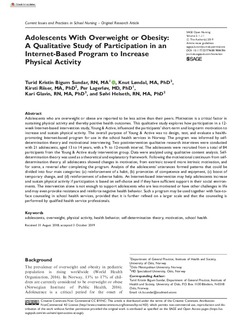Adolescents With Overweight or Obesity: A Qualitative Study of Participation in an Internet-Based Program to Increase Physical Activity
Sundar, Turid Kristin Bigum; Løndal, Knut; Riiser, Kirsti; Lagerløv, Per; Glavin, Kari; Helseth, Sølvi
Journal article, Peer reviewed
Published version
Permanent lenke
http://hdl.handle.net/11250/2628917Utgivelsesdato
2019Metadata
Vis full innførselSamlinger
Sammendrag
Adolescents who are overweight or obese are reported to be less active than their peers. Motivation is a critical factor in sustaining physical activity and thereby positive health outcomes. This qualitative study explores how participation in a 12-week Internet-based intervention study, Young & Active, influenced the participants’ short-term and long-term motivation to increase and sustain physical activity. The overall purpose of Young & Active was to design, test, and evaluate a health-promoting Internet-based program for use in the school health services in Norway. The program was informed by self-determination theory and motivational interviewing. Two postintervention qualitative research interviews were conducted with 21 adolescents, aged 13 to 14 years, with a 9- to 12-month interval. The adolescents were recruited from a total of 84 participants from the Young & Active study intervention group. Data were analyzed using qualitative content analysis. Self-determination theory was used as a theoretical and explanatory framework. Following the motivational continuum from self-determination theory, all adolescents showed changes in motivation, from extrinsic toward more intrinsic motivation, and for some, a reversal after completing the program. Analysis of the adolescents’ utterances formed patterns that could be divided into four main categories: (a) reinforcement of a habit, (b) promotion of competence and enjoyment, (c) boost of temporary change, and (d) reinforcement of adverse habits. An Internet-based intervention may help adolescents increase and sustain physical activity if participation is based on self-choice and if they have sufficient support in their social environments. The intervention alone is not enough to support adolescents who are less motivated or have other challenges in life and may even provoke resistance and reinforce negative health behavior. Such a program may be used together with face-to-face counseling in school health services, provided that it is further refined on a larger scale and that the counseling is performed by qualified health service professionals.
Beskrivelse
Creative Commons Non Commercial CC BY-NC: This article is distributed under the terms of the Creative Commons Attribution- NonCommercial 4.0 License which permits non-commercial use, reproduction and distribution of the work without further permission provided the original work is attributed as specified on the SAGE and Open Access pages

